I cannot help feeling smug. It is not always that I can say I am a millionaire. There I was, crossing the 50 metres or so of tarmac from the plane to the Immigration check point at Hussein Sasteranegara International Airport in Bandung with a few million rupiah on me. Malaysia had just beaten Indonesia for the gold medal in badminton at the Manila SEA Games.
While walking around smugly is one thing, gloating is quite another. It would be a fatal error, I think, to gloat at Indonesians, especially about Malaysia beating them at badminton. I could very easily end up at the bottom of Kawah Ratu, a dormant but the biggest of six volcanic craters on the outskirts of Bandung. I really have no desire to test how hot the temperature can get at the bottom of a volcano, even a dormant one.
For Indonesia, losing to Malaysia in badminton must rank somewhere between the tsunami and running out of clove cigarettes. But then neither do Malaysia like losing to Indonesia in badminton even back when we were losing to every other nation of some badminton repute in the world.
A few days later Malaysia beat Indonesia for the soccer bronze medal. However, by then I was past my gloating stage. Just as well to let it pass since our host and guide was kind enough to show us several variations of lap dancing. All to the accompaniment of music from Michael Learns to Rock, fast tempo and in dangdut version, naturally.
While still humming the non-dangdut version of 25 Minutes Too Late, we took the winding road up to the mountain in a Kijang (which is actually the Indonesian national vehicle minus the AP controversy naturally). The locals just call it puncak (summit), the mountain that is, not the locally-assembled four-wheel drive. The temperature dropped quite fast and we had the air-conditioning switched off and wound down the windows to have a better look at the swiftly changing vegetation and pollute our lungs a bit more.
Then the inside of the four-wheel drive began to take on a slightly unpleasant odour as if all of us were having indigestion and were playing childhood pranks on one another all at the same time. Nothing of that sort was happening, of course. The sulphuric smell was coming from the six volcanoes in the area.
Dormant they may be, but they were definitely emitting strong fumes and smoke that you can smell from quite a distance away. The fact that it had been years since the volcanoes were last active was scant consolation when we stood staring down at the smoky bowels of Kawah Ratu, the biggest of the six craters. We did not make it to the other five for lack of time. To the left of Kawah Ratu and making a wonderful background to the setting of an Indonesian myth was the Tangkuban Parahu mountain range.
As is always the case with any tourist attraction, there would be the usual souvenir peddlers whose vocabulary did not include comprehending the word NO. It was small consolation that some of them were kind enough to take us through the folklore associated with the area. You can tell they have been telling this story countless times to anyone patient enough to lend an ear. But nothing’s ever for free and the price for the story telling was being haggled no end by the story teller and his comrade in charms to buy their wares.
One cheeky fellow wanted to sell me a horn shaped volcanic stone with Quranic inscriptions. When I managed to convince him that I was not a Muslim, he was stumped for a few seconds and quickly put away the holy inscriptions. And that was that, I thought, when suddenly he turned around and there were strings of beads, necklaces and bracelets in his hands. His friends chipped in with some bamboo pens and postcards just for good measure. All were trying to outdo each other with their salesmanship. They were as amazing as the myth connected with the area.
It happened that once upon a time, many tectonic movements and tsunamis ago, in heaven lived a young god. One day he committed a sin with a beautiful goddess (must have been heaven’s version of playing doctor) and they were condemned and banished by the highest God of Sunda Pantheon to live on earth as animals. The goddess turned into a female wild boar, while the god turned into a black dog.The black dog was called Si Tumang. One day a Sunda King, who was hunting in the forest got lost and had the urge to urinate, so he did it in a dry coconut shell. The boar, which was thirsty, accidentally drank the King's urine that was mixed with his sperm. After several months, the boar got pregnant, but instead of giving birth to baby boar, she gave birth to a beautiful baby girl.
The boar then took her baby to the King's hunting log. The King and his men were surprised to find a beautiful baby in the forest. The King considered the baby as a gift from the gods and took her as his own daughter. The baby grew up to be a beautiful princess. The princess is loved by everyone in the kingdom, but she turned out to be a spoiled girl.
The princess was very skilful at cloth weaving. One day her weaving tool drop from the weaving pavilion. Too lazy to pick it up, she vowed that if there was a male that would pick up her weaving tool, she would make him her husband, but if a female were to pick it up, she would make her a sworn sister (this is Sunda after all, so no same sex marriage just yet).
However, it was Si Tumang who took her weaving tool and gave it back to her. Because of her vow, Princess Dayang Sumbi must marry Tumang, the black dog. Ashamed of his daughter’s mistake, the King banished Dayang Sumbi to the forest, living with Tumang, her dog husband (and these days we call that incest and bestiality). During the night, Si Tumang would turn into a handsome god and make love to Dayang Sumbi. Soon Dayang Sumbi gave birth to a baby boy named Sangkuriang. However, Sangkuriang did not know that his beloved and loyal pet, Si Tumang, was his own father. One day Dayang Sumbi had a craving to eat fried deer liver and asked her teenage son to go hunting. Sangkuriang took his dog, Si Tumang to hunt, but strangely, there was not a single animal in sight. Then Sangkuriang spotted a fat boar so he shot an arrow at it. The boar was the goddess incarnation, mother of Dayang Sumbi, Sangkuriang’s grandmother and Si Tumang’s amorous accomplice in Sunda heaven. Si Tumang knew this and he tried to stop Sangkuriang from killing the divine boar. Angered by his pet’s attitude, Sangkuriang accidentally shot an arrow at Tumang, and killed the dog. Confused and depressed, Sangkuriang then cut out Si Tumang’s liver and took it home. Dayang Sumbi cooked Tumang’s liver and ate it. Sangkuriang remained silent and did not want to eat the cooked liver. When Dayang Sumbi asked Sangkuriang where Tumang is, Sangkuriang told her the truth. The shocked Dayang Sumbi ran amok and hit Sangkuriang on the head with a ladle. Sangkuriang’s head was cut wide open and bled, and he suffered from amnesia.
Sangkuriang ran into the forest. Dayang Sumbi, who regretted her actions went looking for Sangkuriang but in vain. Dayang Sumbi then began a life as a hermit, eating only raw vegetables. Thanks to her diet and divine blood, she was able to remain young forever. Sangkuriang grew into a strong and handsome young man and was reunited with Dayang Sumbi and they later became lovers (a touch of Oedipus there, what?). Finally, Dayang Sumbi recognised the scar on Sangkuriang's head while combing her lover's hair and realised that her lover was actually her own son, so she knew she could not marry him.
However, she did not wish to disappoint him by cancelling the wedding. But she would only do so on condition that he provided her with a lake and a boat with which they could sail away on the dawn of their wedding day. Sangkuriang accepted this condition and built a lake by damming the Citarum River. With dawn just moments away and the boat almost complete, Dayang Sumbi realised that Sangkuriang would fulfil the conditions she had set. With a wave of her shawl, she lit up the eastern horizon with flashes of light. Deceived by the false dawn, the cock crowed and farmers rose for the new day.
With his work not yet complete, Sangkuriang realised that his endeavours were lost. In uncontrollable rage, he kicked the boat that he had built. The boat overturned and became the mountain range known as Tangkuban Parahu (in Sundanese tangkuban means upturned and parahu means boat). With the dam broken, the water drained from the lake, turning into a wide plain that now became the city of Bandung (from the word bendung, which means dam). DH Lawrence couldn’t have written a better story.
After our fair share of Oedipal folklore and persistent souvenir peddlers, we made our way to the hot spring or air panas at the base of the mountain. A welcome change from the rather low temperatures of the puncak.
Thursday, September 21, 2006
Subscribe to:
Post Comments (Atom)

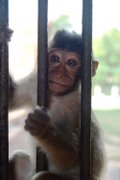
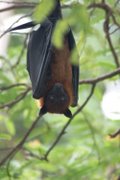
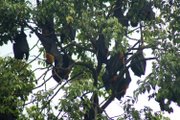
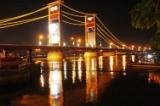
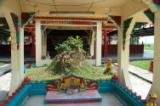
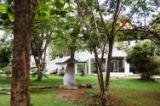
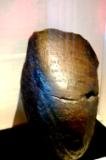
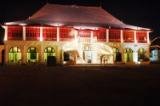
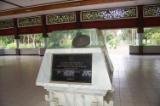
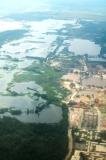
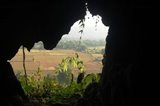
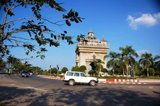
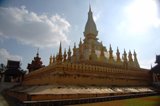
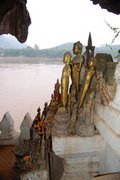
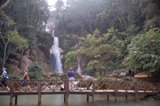
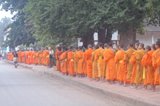
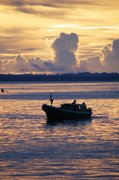
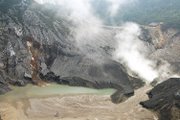
No comments:
Post a Comment